Olympus Automated Fluorescence Microscope BX63
Flexible and easy to use, the fully motorized BX63 microscope uses the motorized nosepiece to focus onto the sample, enabling the stage to be fixed for added stability.
Phone:+86-21-54286005

 Microsystem
Microsystem
 Endoscopysystem
Endoscopysystem
 Energysystem
Energysystem
 +86-21-54286005
+86-21-54286005
 info@tenmed.net
info@tenmed.net
 Room 602, Building 1, No. 111 Luxiang Road (Greenland Park Plaza), Baoshan District, Shanghai, China
Room 602, Building 1, No. 111 Luxiang Road (Greenland Park Plaza), Baoshan District, Shanghai, China

Flexible and easy to use, the fully motorized BX63 microscope uses the motorized nosepiece to focus onto the sample, enabling the stage to be fixed for added stability.
Phone:+86-21-54286005
Flexible and easy to use, the fully motorized BX63 microscope uses the motorized nosepiece to focus onto the sample, enabling the stage to be fixed for added stability. The smooth, silent motorized stage is driven by ultrasonic piezo technology for precise operation.
Enter observation condition data in the touch panel controller, and it’s automatically transferred to cellSens image analysis software. The process manager enables fully automated multichannel image acquisition.

The controller enables you to change observation methods with just a touch. Choose between guidance mode to navigate the procedures currently in use and full mode for access to the entire range of settings. You can save multiple observation points and conditions in advance and quickly recall previously used imaging conditions.

You can detach the stage controller from the frame and place it where it’s most convenient. When used with the ultrasonic stage, it creates a user-friendly workflow with an operation that mimics a manual focusing stage. Switches on the controller enable you to change between different observation methods, objectives, and mirror units while simultaneously selecting intensity adjustments or image capture.

The fixed stage facilitates stable, reliable imaging. Samples are focused using the precise motorized nosepiece. Z-stack capture and deconvolution are also highly accurate.

Change objectives using either the remote handset or PC software for efficient imaging. When combined with cellSens software, you can automate advanced imaging techniques that require multiple magnifications.

Fluorescence illuminators with a fly-eye lens provide homogenous illumination across the entire wavelength spectrum and simplify burner alignment.
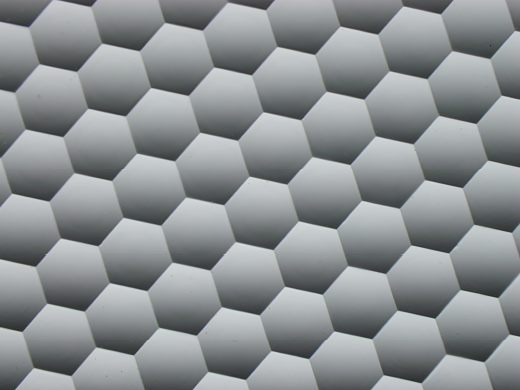
Surface of Fly-eye Lens, Enlarged Image
Easily changeable mirror units to provide flexibility for a wide variety of fluorescence specimens. The design reduces the need to replace mirror units for multicolor or FISH applications, further accelerating your work.
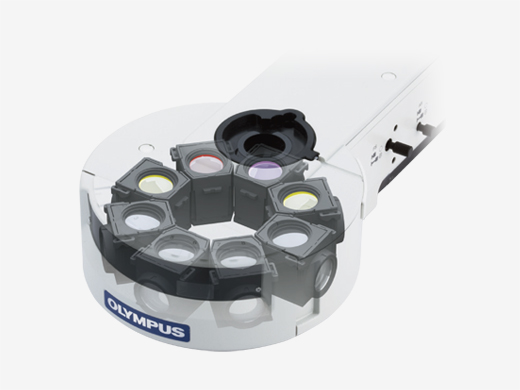
The fluorescence mirror units have advanced coatings that provide high transmission and steep cut-off slopes. The interior surfaces eliminate over 99% of stray light for high sensitivity and sharp color separation.
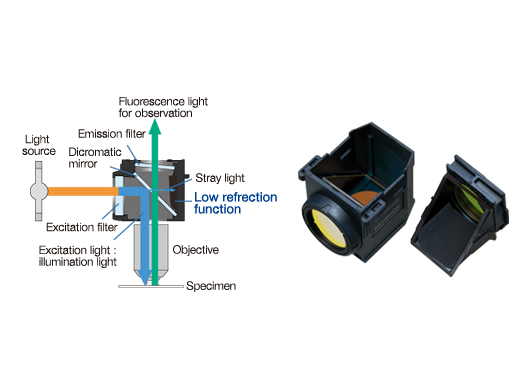
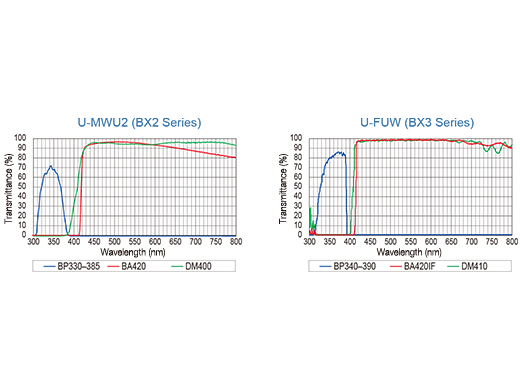
UIS2 objectives with a high numerical aperture (NA) have chromatic aberration corrections to provide high resolution, even from faint fluorescence signals. Advanced coating technologies reduce autofluorescence and improve the signal-to-noise ratio for flat, high transmission over a wide wavelength.
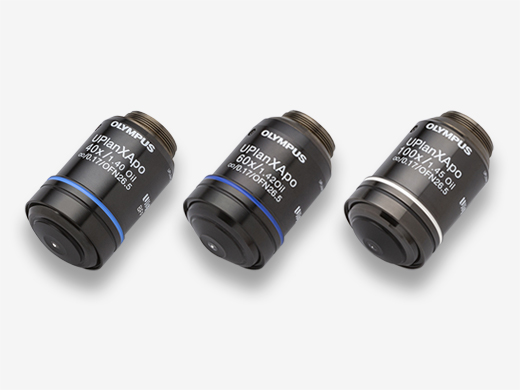
| Observation Method | Brightfield | ✓ | |
|---|---|---|---|
| Darkfield | ✓ | ||
| Phase Contrast | ✓ | ||
| Fluorescence (Blue/Green Excitations) | ✓ | ||
| Fluorescence (Ultraviolet Excitations) | ✓ | ||
| Differential Interference Contrast | ✓ | ||
| Simple Polarized Light | ✓ | ||
| Illuminator | Transmitted Köhler Illuminator | LED Lamp | ✓ |
| 100 W Halogen Lamp | ✓ | ||
| Fluorescence Illuminator | 100 W Mercury Lamp | ✓ | |
| Light Guide Illumination | ✓ | ||
| Focus | Focusing Mechanism | Nosepiece Focus | ✓ |
| Motorized |
|
||
| Intermediate Magnification Changer | Manual Terret | ✓ | |
| Revolving Nosepiece | Motorized (7 positions) | ✓ | |
| Stage | Motorized |
Contact your local sales representative to hear about motorized stage options |
|
| Manual | Manual Stages with Right-Hand Control |
|
|
| Mechanical | Oil Rectangular Stage with Right-Hand Control |
|
|
| Condenser | Motorized | Universal Condenser | NA 0.9/ W.D. 1.5 mm for 1.25X–100X [swing-out: 1.25X–4X, with oil top lens: (NA 1.4/ W.D. 0.63 mm)] |
| Manual | Universal Condenser | NA 0.9/ W.D. 1.5 mm for 1.25X–100X [swing-out: 1.25X–4X, with oil top lens: (NA 1.4/ W.D. 0.63 mm)] | |
| Swing-Out Condenser | NA 0.9/ W.D. 2 mm (1.25X–100X) | ||
| Achromatic/Aplanatic Condenser | NA 1.4/ W.D. 0.7 mm (oil) (10X–100X) | ||
| Darkfield Condenser Dry | NA 0.8–0.92/ W.D. 4.52 mm (10X–40X) | ||
| Darkfield Condenser Oil | NA 1.2–1.4/ W.D. 0.5 mm (20X–100X) | ||
| Observation Tubes | Widefield (FN 22) | Binocular | ✓ |
| Tilting Binocular | ✓ | ||
| Trinocular | ✓ | ||
| Tilting Trinocular | ✓ | ||
| Ergonomic Tilting Binocular | ✓ | ||
| Tilting, Telescopic, Lifting Binocular | ✓ | ||
| Trinocular for Infrared | ✓ | ||
| Erected Trinocular | ✓ | ||
| Erected Ergonomic Tilting Binocular | ✓ | ||
| Dimensions (W × D × H) | 294.5 mm × 740.5 mm × 582.5 mm (12 in. × 29.2 in. × 23 in.) (Epifluorescence configuration) | ||
| Weight | 35 kg (Epifluorescence Configuration) | ||
| Operating Environment | Indoor Use | Ambient Temperature | 5 °C–40 °C (41 °F–104 °F) |
| Maximum Relative Humidity | 80% for temperatures up to 31 ºC (88 ºF), decreasing linearly through 70% at 34 ºC (93 ºF), 60% at 37 ºC (99 ºF), to 50% relative humidity at 40 ºC (104 ºF) | ||
| Supply Voltage Fluctuations | ±10 % |

